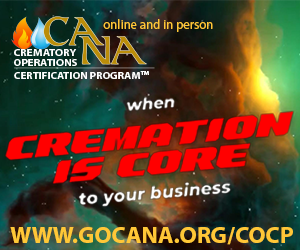Maybe the word is getting out. . .it’s honorable and rewarding

I served as a “front line” funeral director for over 33 years. I did my share of night calls, prep room work, arrangements, and funeral duty. One thing that I take from that experience is that “I always felt, by the way I worked with a client family, like I could make a difference in the life of another”. . . . and, that was a satisfying feeling to have.
In retirement I miss that. . . but maybe funeral directors have been able to get the word out that, while aspects of funeral service employment are difficult, there can be this feeling of satisfaction that many other employment opportunities cannot give.
I say that as I read the report in the Memorial Business Journal about the state of funeral service education in 2022. It turns out that 2022 was not only the highest year on record for single year enrollment in the 59 accredited programs with 3,462 new enrollees, but the total enrollment for the year – all classes — was 7,034 — which evidently is also a record and 10% higher than the number enrolled in 2020.
Robb Smith, the Executive Director of the American Board of Funeral Service Education (ABFSE) is quoted in the article as saying, ““Labor pool issues are a paramount concern in funeral service across the country, so it is good to see that interest in funeral service education is not shrinking. This is even more significant during a time when the traditional college-age population is not growing.”
From my point of view I would agree with Mr. Smith. This is a positive trend for funeral service and one that we need to keep moving forward. Other recruiting of future funeral service employees such as the “Journey to Serve” program instituted by The Funeral Service Foundation and ICCFA Educational Foundation which targets those leaving the military service for 2nd careers in funeral service can continue to help bolster these record numbers of students.
A couple of interesting pieces of information I picked up on in the article were:
- Over 75% of the new student enrollees were women.
- The largest 5-year age bracket cohort for new enrollees was the ages of 21-25
- Only 13.4% of new enrollees were in the age cohort that would be considered “usual age college freshman” — that age bracket being those under 20 years of age
- Almost 32% of the first time funeral service education enrollees were in the age bracket of 31-50. Certainly, second careers for these people.
- Only 10% of new enrollees came from a family where a parent was involved in funeral service.
One issue that Robb Smith, Executive Director of ABFSE commented on was the number of students who withdrew from school without completing a degree in funeral service. Mr. Smith made this comment about that situation, “We know funeral service is not a career for everyone. Students often embark on their education in funeral service without a clear picture of what is expected in the workplace. . .”
While it’s a given that pay and benefits have to measure up to attract great professionals to our work, there is also something to be said of “letting them know what they are getting in to”. That thought goes to both the positives such as the feeling of helping others and the negatives such as long hours and workload.
I think funeral service professionals have now recognized that there are lots of people interested in funeral service, but there is also somewhat of a non-transparent curtain of all the work that is done while in the profession. The State of Kansas recently recognized that and now allows potential funeral service professionals to take six months of their funeral service apprenticeship before entering mortuary school and the final six months following graduation. It’s thought that this will give some of those future students a more realistic idea of how their future profession will play out and an opportunity to see if they want the life-style before they enroll in the program. You can read an article on this new Kansas law here.
The death care profession needs to continue to have professionally trained and skilled workers moving forward. The higher our profession is thought of, and the more creative we can be on how to educate these students, who will become our profession’s eventual leaders, the better we will be positioned as we move forward in our continuing quest to serve those who call.
Related — Here’s an interesting article on how embalming techniques are being taught “long-distance” in Australia. Western Australia Today (Australia)
Related — Here’s an article concerning the difficulty of getting doctors to areas of most need and the federal government’s financial involvement in recruiting them. “National Health Services Corps: The Federal Government’s $1 billion effort to recruit the next generation of doctors at risk”. Healthworld.com
More news from the world of Death Care:
- Breathing life into funeral service startups. BQ Prime powered by Bloomberg (India)
- Northlandia: Cemetery-walking volunteers keep history, geneology alive — and online. Duluth News-Tribune (MN)
Enter your e-mail below to join the 3,245 others who receive Funeral Director Daily articles daily:




















